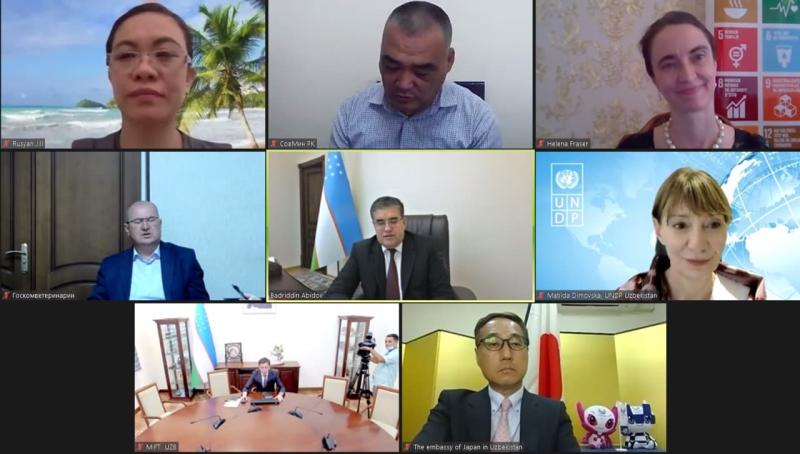

The Third Meeting of the Advisory Committee on sustainable development of the Aral Sea Region in Uzbekistan was held on 8 July 2021 in a virtual format.
The meeting was organized by the United Nations in Uzbekistan together with the Ministry of Investments and Foreign Trade (MIFT) of Uzbekistan with the participation of relevant ministries and departments, as well as representatives of international and public organizations and the private sector.
The Advisory Committee operates with the support of three Working Groups. In particular, the Visibility Working Group endorsed the Terms of Reference and adopted the Work Plan for 2021. Within its framework, participation, co-organization of international events such as participation to the 26th Conference of Parties (COP26) of the United Nations Framework Convention on Climate Change (UNFCCC), are planned with the direct engagement of the Government, the UN, and relevant stakeholders.
Through the series of workshop sessions of the Working Group on Sustainable Investments from February to July 2021, collective thinking methodology was applied to identify six integrated issues such as land and scarce resources, demographic shifts, persistent cultural norms, changes in industry, education and workforce misalignment, and governance of infrastructure in the Aral Sea region. Thus, the United Nations Development Programme (UNDP) in Uzbekistan, in cooperation with partners, is constructing systems interventions or systemic responses to systemic challenges. As a result, the Group was able to develop high-impact proposals.
The Technical Group on Data and Assessments led by UNDP provides evidence and rationale for portfolio analysis and investments in the Aral Sea region. The team of international experts has been mapping the data available in different sources. The mapped data has been categorized in three groups: (i) available and accessible; (ii) available, but inaccessible; and (iii) unavailable and inaccessible. Data Repository is one of the key milestones of the Group so far.
The socio-economic portrait and 2030 forecast scenarios for Karakalpakstan have been presented by UNDP. Socio-economic trends for the last decades and 2030 forecast scenarios have been analyzed and shared with the participants. It was concluded that Karakalpakstan has benefitted from significant investments and resource transfers and made progress in catching up with the rest of Uzbekistan in terms of per-capita income, agricultural production, and access to basic services. Meanwhile, progress is evident relatively to a lesser extent in some other areas, such as employment growth, social protection systems, and poverty reduction.
The Government of Uzbekistan presented the draft of the Integrated Roadmap. The purpose of the Integrated Roadmap is the implementation of the UN Resolution, which will lead to the sustainable improvement of the living conditions and livelihoods of people in the Aral Sea region of Uzbekistan, as well as the restoration of an active ecosystem and enhancement of biodiversity in the surrounding areas. The integrated roadmap of program measures for the cohesive development of the Aral Sea region will:
Ms. Dimovska, UNDP Resident Representative, underscored that “The Integrated Roadmap is informed by the systems approach, and its implementation shall also be guided by such approach, which necessitates the engagement of a wide range of stakeholders within the Working Groups to bring transformative changes in support of the sustainable development of the Aral Sea region. UNDP stands ready to support the implementation process, as well.”
In his turn, Mr. Atsushi Suda, Deputy Chief of Mission of the Japanese Embassy in Uzbekistan, stated that Japan appreciates the draft of the Roadmap since it is more comprehensive and reflects clear expected outputs. Mr. Suda noted that Japan has contributed to the Resolutions aimed at environmental restoration for more than 25 years. About USD 10 million was injected into 26 grant assistance grassroots projects to improve health and tackle salinization in rural areas.
To summarize, Ms. Helena Fraser, UN Resident Coordinator in Uzbekistan, and Co-chair of the Multi-Partner Human Security Trust Fund Steering (MPHSTF) Committee welcomed inputs on the Integrated Roadmap to be further endorsed by the Government. She said, ”The Roadmap is a first step to realizing the UN General Assembly Resolution on declaring the Aral Sea as a zone of innovations and technologies and also as the next step in our collective efforts to accelerate joint action on addressing Aral Sea issues and ensure sustainable, data-driven, and evidence-based impact”.
Originally published on aral.mptf.uz